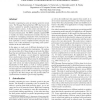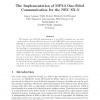134
click to vote
CLUSTER
2009
IEEE
14 years 12 months ago
2009
IEEE
Scientific computing has seen an immense growth in recent years. The Message Passing Interface (MPI) has become the de-facto standard for parallel programming model for distribute...
116
click to vote
EUROPAR
2006
Springer
15 years 5 months ago
2006
Springer
Abstract. Automatic performance analysis of parallel programs can be accomplished by scanning event traces of program execution for patterns representing inefficient behavior. The ...
SC
2000
ACM
15 years 6 months ago
2000
ACM
We describe the MPI/SX implementation of the MPI-2 standard for one-sided communication (Remote Memory Access) for the NEC SX-5 vector supercomputer. MPI/SX is a non-threaded impl...
111
click to vote
PVM
2004
Springer
15 years 7 months ago
2004
Springer
The one-sided communication operations in MPI are intended to provide the convenience of directly accessing remote memory and the potential for higher performance than regular poin...
113
click to vote
PVM
2005
Springer
15 years 7 months ago
2005
Springer
MPI defines one-sided communication operations—put, get, and accumulate—together with three different synchronization mechanisms that define the semantics associated with th...
111
click to vote
IPPS
2006
IEEE
15 years 8 months ago
2006
IEEE
This paper demonstrates the one-sided communication used in languages like UPC can provide a significant performance advantage for bandwidth-limited applications. This is shown t...
113
click to vote
IPPS
2009
IEEE
2009
IEEE
Scaling communication-intensive applications on BlueGene/P using one-sided communication and overlap
15 years 8 months ago
In earlier work, we showed that the one-sided communication model found in PGAS languages (such as UPC) offers significant advantages in communication efficiency by decoupling d...
124
click to vote
ICPPW
2009
IEEE
15 years 8 months ago
2009
IEEE
A significant fraction of parallel scientific codes are iterative with barriers between iterations or even between phases of the same iteration. The sender of a message is assur...
129
click to vote
CCGRID
2009
IEEE
15 years 8 months ago
2009
IEEE
As high-end computing systems continue to grow in scale, the performance that applications can achieve on such large scale systems depends heavily on their ability to avoid explic...


